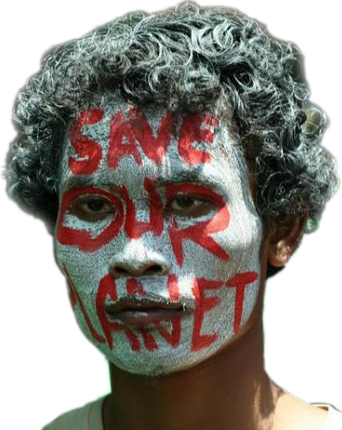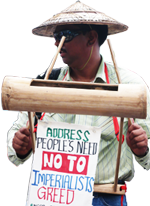| Oil Exploration: Boon or Bane for Manipur |
 |
 |
|
| Wednesday, 29 August 2012 15:12 |
|
by Jiten Yumnam
For long, Manipur has been known as a golden land. True indeed, oil deposits have been confirmed in several parts of the region. One might presume oil and natural gas discovery in Manipur could propel the strife-torn, conflict-ridden, cash-strapped places like Manipur to new economic and political heights, to liberate itself from shackles of poverty, conflict, political imbroglios and never ending fiascos. However, the resonating voices against Oil exploration from nooks and corners of Manipur tell a different tale. Manipur witnessed a series of peoples’ conglomerations[i] expressing deep concerns with both the process and impacts of oil exploration moves in Manipur.
Massive community protest and objections to the environmental public hearings for oil explorations at Jiribam, Parbung and finally at Nungba Town on 30 July, 8 and 17 August 2012 marked the three hearings. In a historical moment for Manipur, the environmental public hearing at Nungba was cancelled due to stiff community oppositions, who were also able to extract a written note of public hearing cancellation from officials of the Manipur Pollution Control Board, the Deputy Commissioner of Tamenglong District and Jubilant oil and Gas Private Limited, etc.
|
| Read more... |
| Loss and damage: Defining slow onset events |
 |
 |
|
| Tuesday, 28 August 2012 11:07 |
|
TWN Briefing Paper on Loss and Damage No.3
Asia and Eastern Europe Regional Meeting
27 ?-29 August 2012, Bangkok
Published by Third World Network
www.twn.my
Loss and damage: Defining slow onset events
by Doreen Stabinsky & Juan P. Hoffmaister
The Earth is slow to warm. Even if all emissions were halted immediately, historical emissions would cause warming, and impacts, for years to come. Current committed warming will bring about extreme weather events ? droughts, floods, extreme heat waves ? as well as impacts manifested as slow-onset changes and state shifts in climate. With current levels of committed warming we also face the risk of passing tipping points of important climate system elements (1) that may trigger a process of abrupt and non-linear climate change. (2) In this brief we describe in more detail such slow-onset processes and the loss and damage they may cause, in particular to human lives and livelihoods. We also consider the emerging governance challenges under the UNFCCC of managing long-term threats associated with slow-onset processes, state shifts, and tipping points.
Introduction
With Decision 1/CP.16, Parties agreed to consider slow-onset events in the work programme on loss and damage. Decision 1/CP.16 includes a footnote that lists categories of impact that negotiators considered to be ?slow onset events?: sea level rise, increasing temperatures, ocean acidification, glacial retreat and related impacts, salinization, land and forest degradation, loss of biodiversity and desertification.
These slow-onset ?events? ? more appropriately termed slow-onset processes, hazards, or impacts ? are an important element in the conversation on loss and damage, distinct from extreme events. The losses that result from slow-onset processes will affect many more people than extreme events over a long period of time. Because they are persistent and develop over time, they are not amenable to many of the approaches currently under consideration for addressing extreme events, such as index-based insurance.
|
| Read more... |
| Loss and Damage: Some key issues and considerations |
 |
 |
|
| Tuesday, 28 August 2012 10:47 |
|
Loss and Damage: Some key issues and considerations
By Doreen Stabinsky and Juan P. Hoffmaister
The series of expert meetings on a range of approaches to address loss and damage associated with the adverse effects of climate change, including impacts related to extreme weather events and slow onset events, is a significant element of the SBI work programme on loss and damage. The discussions at the Latin American regional meeting should provide substantive input to the decision on loss and damage to be adopted at COP18 in Doha in December. We provide this background note as a contribution to the regional meeting and the important discussions that will take place there.
I. Background – what is loss and damage and why is it important?
The phrase “loss and damage” refers broadly to the entire range of damage and permanent loss “associated with climate change impacts in developing countries that are particularly vulnerable to the adverse effects of climate change” (Decision 1/CP.13. See the Annex for the mandate and negotiating history on loss and damage within the UNFCCC) that can no longer be avoided through mitigation nor can be avoided through adaptation. There are multiple approaches to address those damages and losses, some which may have synergies with adaptation efforts, while others will require taking action through new arrangements and stand-alone approaches. Obligations under the UNFCCC related to loss and damage require attention by the Parties, and the regional meetings provide a unique window to contextualize local, national and regional challenges in a manner whereby the Parties to the Convention can decide adequate next steps at COP18.
|
| Read more... |
| Loss and damage: key issues and considerations for the Bangkok regional expert meeting |
 |
 |
|
| Tuesday, 28 August 2012 10:26 |
|
TWN Briefing Paper on Loss and Damage No.2
Asia and Eastern Europe Regional Meeting
27-29 August 2012, Bangkok
Published by Third World Network
www.twn.my
Loss and damage: key issues and considerations
for the Bangkok regional expert meeting
by Juan P. Hoffmaister, Doreen Stabinsky & Nathan Thanki
The series of expert meetings on a range of approaches to address loss and damage associated with the adverse effects of climate change, including impacts related to extreme weather events and slow onset events is a significant element of the SBI work programme on loss and damage. The discussions at the regional meeting for Asia and Eastern Europe should provide substantive input to the decision on loss and damage to be adopted at COP18 in Doha in December. We provide this background note as a contribution to the regional meeting and the important discussions on 27-29 August in Bangkok.
I. Background ? what is loss and damage and why is it important?
The phrase ?loss and damage? refers broadly to the entire range of damage and permanent loss ?associated with climate change impacts in developing countries that are particularly vulnerable to the adverse effects of climate change?(1) that can no longer be avoided through mitigation nor can be avoided through adaptation. There are multiple approaches to address those damages and losses, some which may have synergies with adaptation efforts, while others will require taking action through new arrangements and stand-alone approaches. Obligations under the UNFCCC related to loss and damage require attention by the Parties, and the regional meetings provide a unique window to contextualize local, national and regional challenges in a manner whereby the Parties to the Convention can decide adequate next steps at COP18.
|
| Read more... |
| STOP OIL EXPLORATION AND DRILLING IN MANIPUR |
 |
 |
|
| Tuesday, 14 August 2012 14:58 |
|
URGENT APPEAL AGAINST OIL EXPLORATION AND DRILLING IN MANIPUR BY JUBILIANT OIL AND GAS PRIVATE LIMITED
The Government of India through its Ministry of Petroleum and Natural Gas had granted license to Jubiliant Oil and Gas Private Limited (JOGPL), based in Netherlands for exploration and drilling works in two oil blocks in Manipur located in the Jiribam (Imphal East), Tamenglong and Churachandpur districts of Manipur, without informing and taking the consent of all indigenous peoples of Manipur. The contracts were awarded under the eighth round of New Exploration Licensing Policy (NELP) of the Government of India. Earlier, without informing the people of Manipur again, the Government had undertaken series of promotions globally in 2003 and 2009 to promote the oil blocks in Manipur along with others through road-shows in major cities worldwide, London, Houston, Calgary and Perth etc, inviting bids to Oil companies.
|
| Read more... |
|
|
 The Peoples' Movement on Climate Change (PMCC) seeks to advance the People's Protocol on Climate Change as the Southern peoples' strategy and response to the climate change issue.
The Peoples' Movement on Climate Change (PMCC) seeks to advance the People's Protocol on Climate Change as the Southern peoples' strategy and response to the climate change issue.



